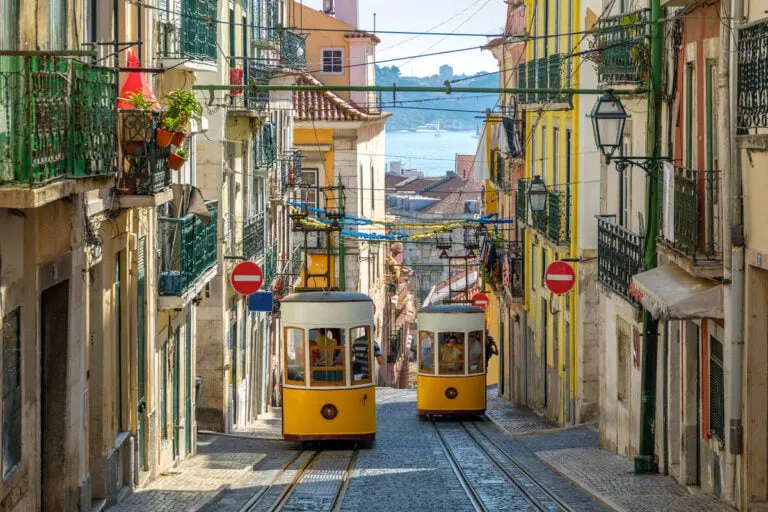If you’re a History buff with a professed love for all things Europe, and cobbled streets, ancient sites, and fairytale-like medieval castles make your heart beat faster, budget-friendly Portugal is likely to rank high on your list of places to visit this year.
Not only is it affordable by Western European standards, but based on the latest data shared by Google, the homeland of the Lusophones is the fourth most-searched destination globally right now, surpassing tourism giants like Egypt, Thailand, and even trendy Croatia.
Portugal has never been as popular as it is now, and you may be wondering what sets it apart from the rest and why it is poised to become one of Europe’s tourism hotspots in 2024:
A Cultural Hotspot That’s Been Overlooked For Far Too Long
Located in mainland Europe’s Westernmost point, Portugal is an ancient country with a History spanning over 2,000 years, from the Roman period until the modern era, and a cultural relevance that is often downplayed compared to Spain, France, Italy, and the like.

In a way, it’s surprising Portugal didn’t explode in popularity much sooner: though Portuguese History is not on your average History textbook, this was a major naval power across the pond, with an empire that stretched as far as the Americas, as well as parts of West Africa and Asia.
During the Age of Discoveries, Portugal amassed one of the greatest riches in Europe, and the legacy of colonialism, albeit controversial, can still be seen across its cities, where majestic imperial palaces stand, and ornate, gold-laden churches and their whitewashed towers dot cityscapes.

If anything, much of the country still acts as a window to the past, presenting visitors to Europe with some of that Old World charm they so desperately crave.
Portugal Is Incredibly Diverse
Every destination in the country is distinctive in its appeal and tourist offer.
Built across seven hills, as dictated by Roman policy at the time, Lisbon, the Portuguese capital, is essentially an open-air museum jam-packed with historical sites, such as Alfama, a hippy district famous for its narrow, colorful houses, and the ancient, hilltop Saint George’s Castle.

Porto, in the North, is the go-to spot for sampling Portuguese food, as it concentrates a number of award-winning eateries, including Dona Mira and Casa Nanda, and it’s in the surrounding countryside, dominated by rolling green hills, where the world-renowned Porto wine is made.
Looking to beat the crowds and mingle with the locals?
You’ll probably want to add off-path towns like Aveiro, dubbed the Portuguese Venice due to its elongated canals and flamboyant gondolas, and Evora and its perfectly-preserved, 1st-century Roman temple to your list.

Don’t get us started on Portuguese nature. It definitely deserves its own section.
A Small Country With Gorgeous Nature
From the snowy peaks of Serra da Estrela down to the sunny Southern coast, Portugal has some of the most diverse breathtaking natural scenery anywhere in Europe, in spite of its small landmass.
You could spend a literal lifetime exploring the country without ever checking off your bucket list in its entirety.
For beaches and a subtropical coastal atmosphere, hit the laid-back Algarve, a year-round warm destination with postcard-ready golden sand crescents and picturesque coastal villages bounded by a bright-blue Atlantic Ocean.

Can’t wait to escape into nature and hiking is your thing?
A visit to the stunning, densely forested, mountainous island of Madeira, a part of Portugal that is off the coast of West Africa, should definitely be on your itinerary (find out why here).
Let’s not forget about the majestic wilderness of the Azores: with its unruffled beaches, deep calderas, otherwordly landscapes, and Atlantic nature, it is a remote, unspoiled archipelago in the middle of the Atlantic Ocean also flying the Portuguese flag.

Portugal Is Quite Affordable As A Tourist Destination
Last but not least, Portugal can be considered an affordable European destination.
Southern Europe is typically associated with inflated hotel rates and high consumer prices, but this doesn’t apply to Portugal, where daily expenses for a mid-range vacation average an acceptable $44, and tourists are expected to pay $130 per night for rooms.

Hostels are even cheaper, averaging $55 in popular tourist cities, and according to Budget Your Trip, a one-week ‘budget’ trip to Portugal for two people totals roughly $858, excluding flights, if traveling luxuriously is not an absolute must.
In fact, Lisbon was just crowned the cheapest city break in Europe recently, based on a 173-city research carried out by U.K. based Economist Intelligence Unit, and seeing it is the capital, the country’s most-visited destination, and where prices are typically higher, it confirms Portugal is indeed a bargain.
Looking to get inspired for your next trip? Find out which are the five cheapest cities in Portugal here.
Credit: Source link

